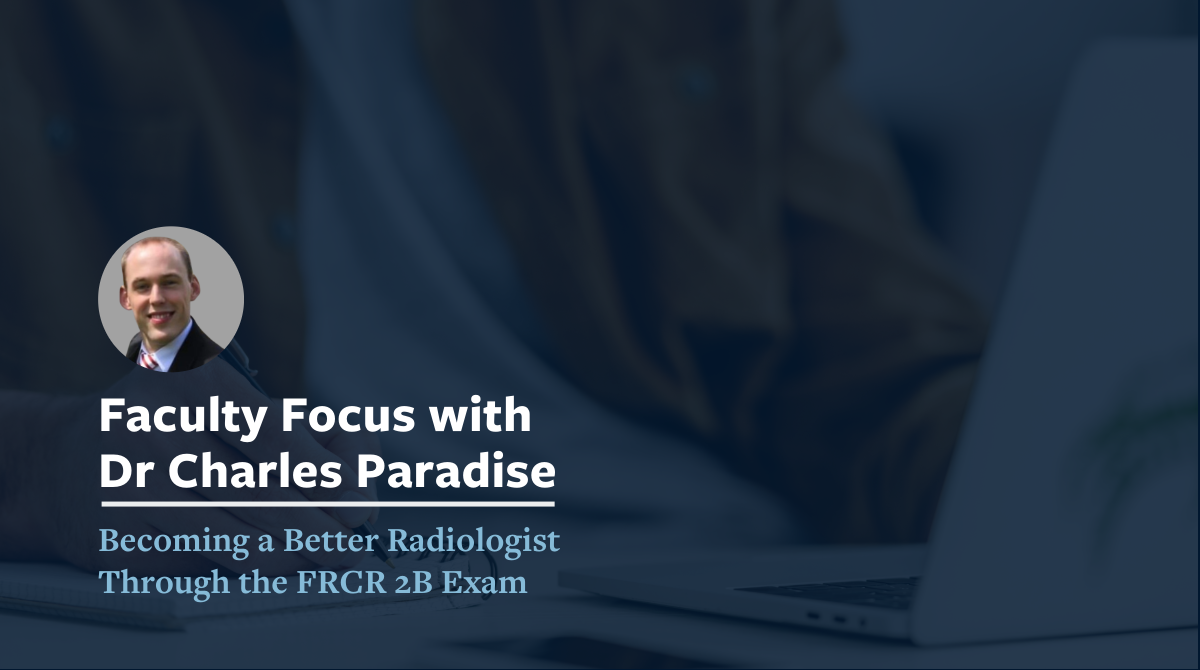
Becoming a Better Radiologist Through the FRCR 2B Exam with Dr Charles Paradise

Revise Radiology
July 2nd, 2024
The journey to becoming a proficient radiologist is both challenging and rewarding. Dr Charles Paradise, an ST4 in subspecialty training in paediatric radiology, shares his unique experience and approach to tackling the FRCR 2B exam. In this comprehensive article, we delve into his insights and strategies that can be instrumental for any radiologist preparing for their FRCR exams.
From Paediatrics to Radiology
Dr Paradise initially trained in paediatrics, up to the ST6 level, before transitioning to radiology in 2018. His interest in radiology was sparked during his paediatric training, where he frequently engaged with radiologists in multidisciplinary team (MDT) meetings and gained hands-on experience with cranial ultrasound imaging and echocardiography. This exposure to the practical aspects of radiology led him to pursue a career in paediatric radiology.
Radiology is such an important aspect of paediatric and neonatal care. My long-term plan is to become a pediatric radiologist, combining my expertise in pediatrics with radiology.
The FRCR Exam Journey
Facing the 2A Exam
Dr Paradise's journey through the FRCR exams was not without its hurdles. He needed four attempts to pass the 2A exam and two attempts to clear the 2B exam. His approach to the 2A exam was methodical and focused on iterative improvements rather than aiming for immediate success.
I realised there was some work to be done. My focus was not to pass the second time but to ensure that I had these iterative step changes of improvement.
He emphasised the importance of making small, consistent improvements and using a single text, "Core Radiology," enhanced with notes, coloured highlighters, and sticky notes to aid in retention and quick reference.
Preparing for the 2B Exam
After clearing the 2A exam, Dr Paradise took a strategic approach to prepare for the 2B exam. He allowed himself a six-month preparation period, balancing his study time between work and personal commitments.
Rapid Reporting
For rapid reporting, he leveraged his work experience to see as many plain films as possible. He exclusively used the Revise Radiology platform for practice, appreciating its close simulation to the actual exam.
The Revise Radiology platform's detailed feedback and scoring were very close to what I experienced in the actual exam, giving me confidence in my preparation.
Long Cases and Vivas
Dr Paradise applied a similar structured approach to long cases and vivas. He organised face-to-face consultant viva sessions at his hospital, complementing them with extensive practice using the Revise Radiology platform.
The strategy taught to me by Dr Ian Harris for vivas was to spend the initial 30 seconds reviewing the radiograph in silence, identifying significant abnormalities before verbalising findings.
This approach helped him develop a systematic way of tackling both long cases and vivas, focusing on succinct and relevant descriptions and management plans.
Work-Life Balance and Resilience
Balancing work, study, and personal life was a significant challenge for Dr Paradise. Effective communication with his family and organising his study schedule meticulously were key to his success.
I had to make the decision to go part-time to dedicate more time to my preparation. This was crucial in allowing me to fully commit to my study schedule.
He emphasizes the importance of discussing the time commitment required for exam preparation with family and considering flexible work arrangements if possible.
Celebrating Success and Looking Forward
Clearing the FRCR exams was a monumental achievement for Dr Paradise. He recalls the joy of sharing his results with his wife via a live video call, a moment symbolising the culmination of hard work and support from loved ones.
The feeling of clearing the 2B exam was remarkable, and sharing that moment with my wife made it even more special.
Dr Paradise’s journey highlights the importance of perseverance, systematic preparation, and leveraging available resources effectively. His experience underscores that becoming a better radiologist is a continuous process of learning and improvement.
Final Thoughts
Dr Paradise encourages radiologists preparing for their FRCR exams to focus on iterative improvements and to embrace the learning process as a path to becoming better radiologists.
Shift your mindset from ‘I have to pass’ to ‘How can I become a better radiologist?’ Over time, this approach will naturally lead to success.
By following Dr Paradise’s systematic approach and utilising resources like the Revise Radiology platform, radiologists can enhance their preparation and ultimately succeed in their FRCR exams.
Dr Paradise used Revise Radiology's FRCR 2B Combined Subscription and attended the South West FRCR 2B Course and the Norwich FRCR 2B Course for his FRCR 2B Revision. Since passing the FRCR 2B Examination, Dr Paradise is now an examiner and collaborator on the Revise Radiology FRCR 2B Rapids and Longs Course.
